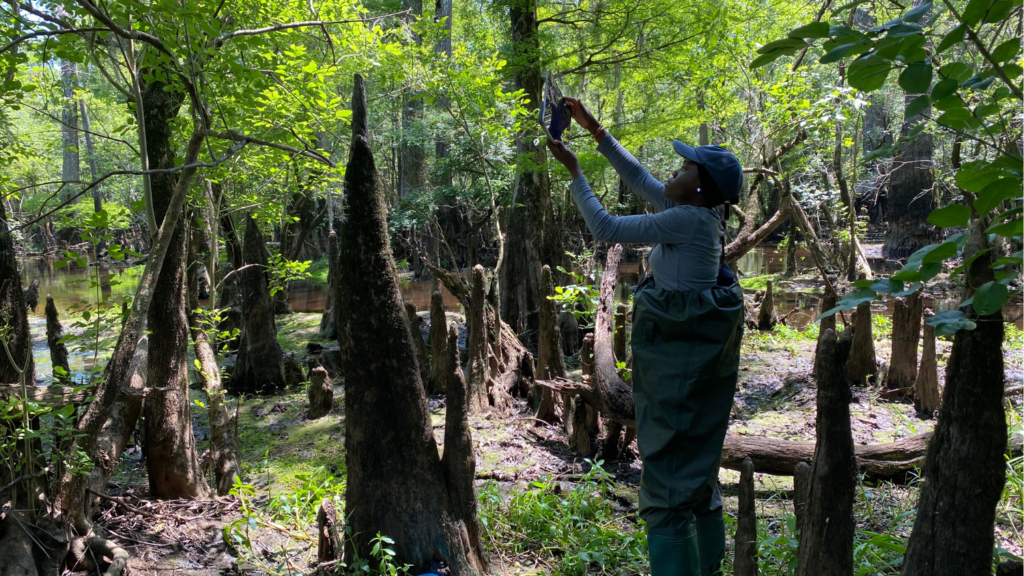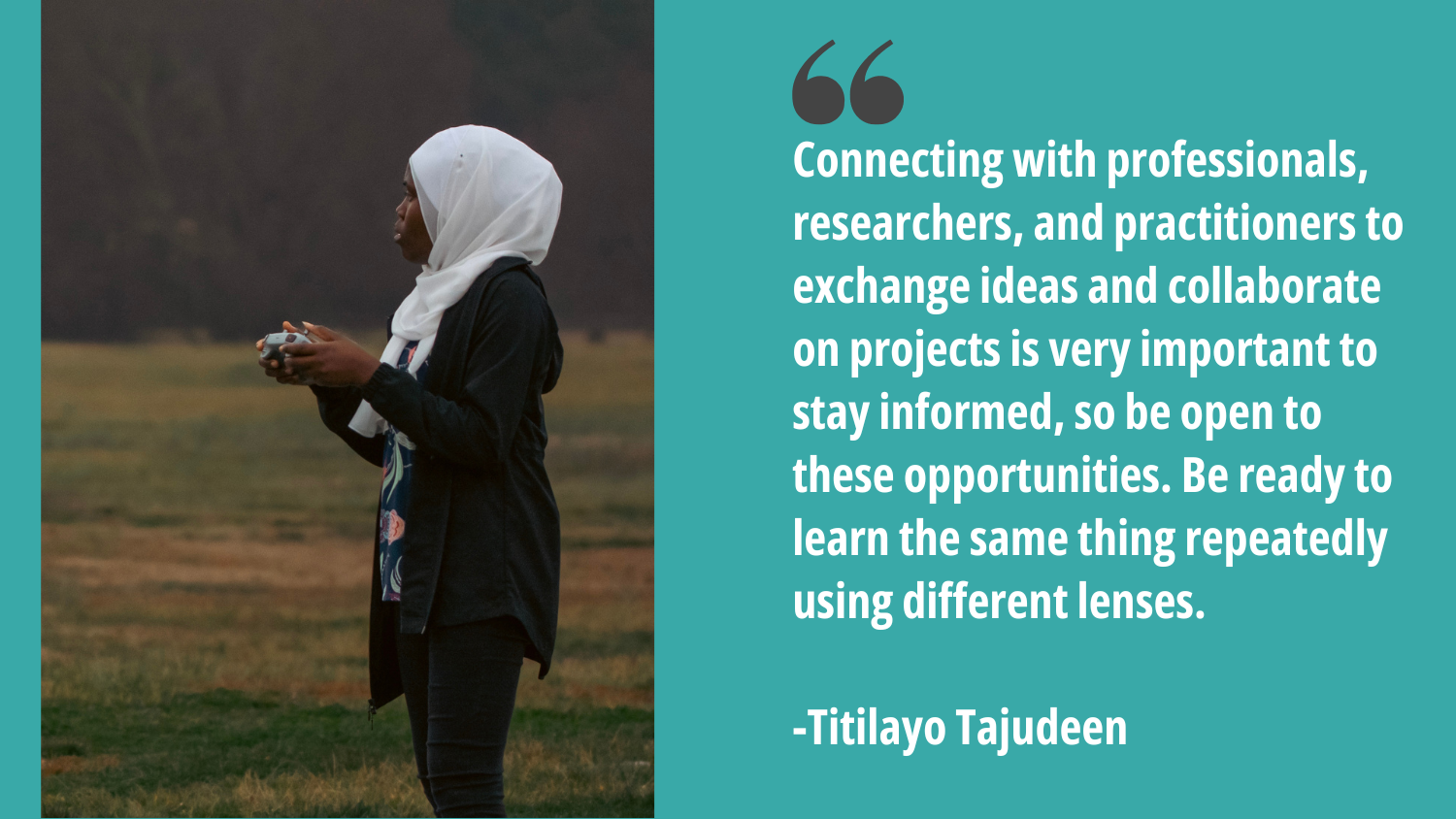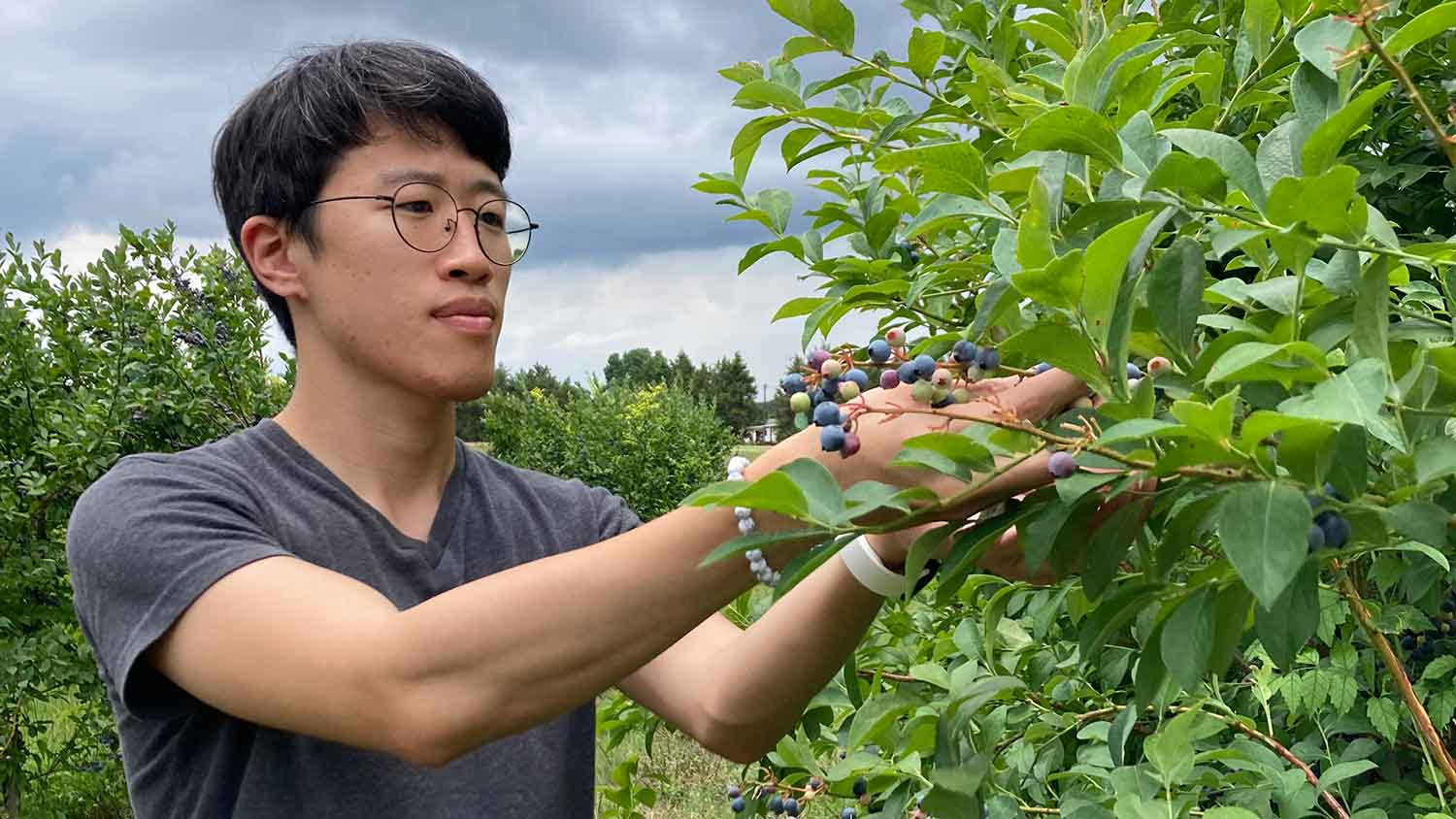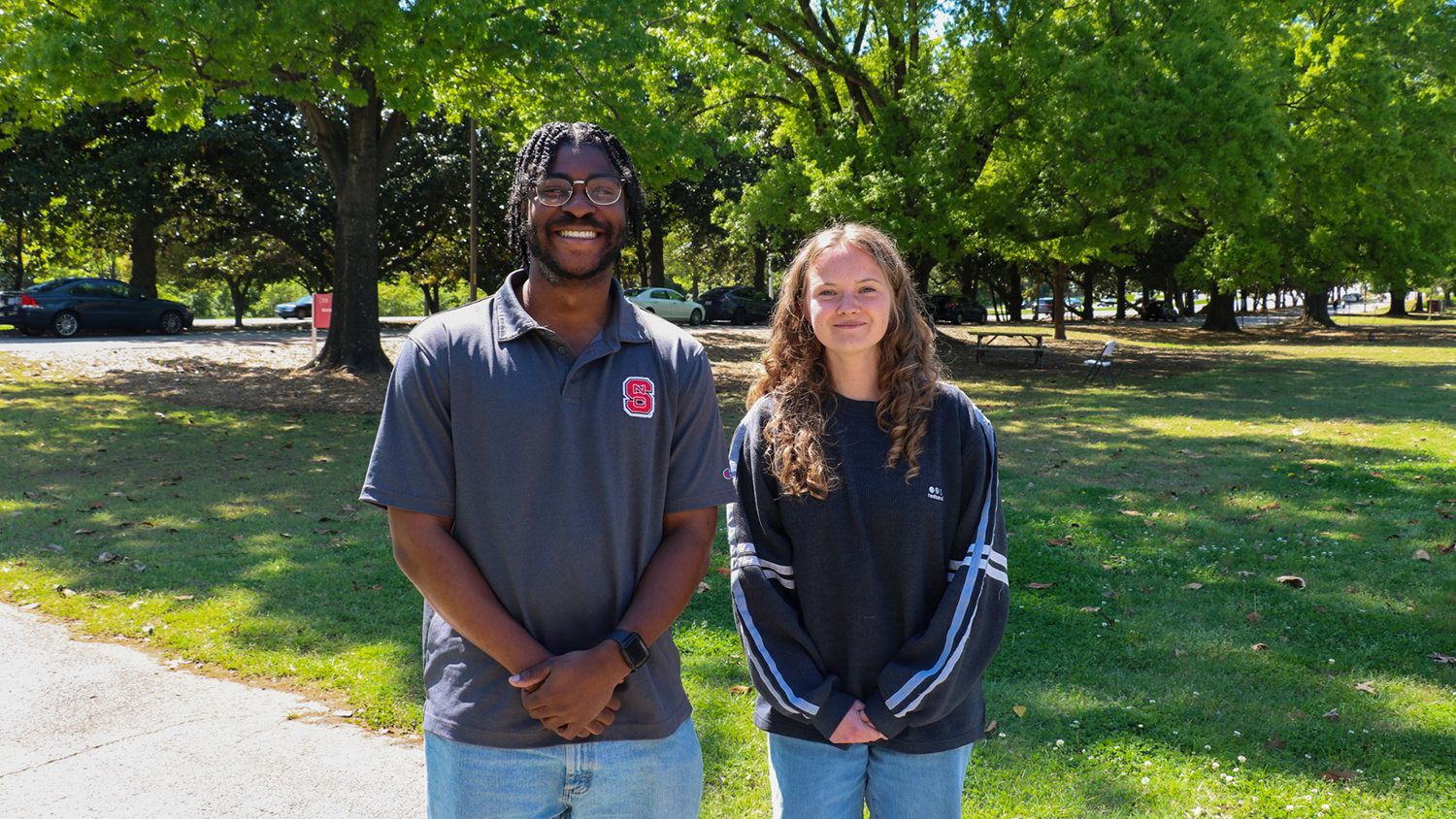2023-24 Global Change Research Fellow
PhD Student, Geospatial Analytics
Advisor: Dr. Katie Martin
About You
What do you study?
My research focuses on understanding coastal forest dynamics amidst climate change by employing a combination of remote sensing techniques, field observations, and machine learning algorithms. Coastal ecosystems are increasingly vulnerable to degradation due to accelerating sea-level rise, intensified extreme weather events, and human-induced impacts like land use change. My research delves into the significant implications of factors such as saltwater intrusion on forested wetlands in the coastal ecosystems. Specifically, my work involves assessing the occurrence rate of “Ghost forests” and predicting the potential expansion of forest loss, along with its hydrological consequences. Through close monitoring of these changes and their adverse effects, effective strategies can be developed to manage this ecosystem.
What (or who) influenced you to go into this field of study?
Growing up in Nigeria’s most populous city limited my exposure to nature’s beauty. However, while studying geography during my undergrad, I discovered the intricate workings of ecosystems and the interdependency between different Earth spheres. Engaging in fieldwork across remote towns in various states gave me firsthand experience of natural landscapes, connecting classroom learning to real-world scenarios. When selecting my undergraduate research topic, my professor, Dr. Ayo Omotayo, directed my focus toward investigating the validity of “climate change: myth or fact.”. This redirected my academic path, and thus, my thesis explored the impact of climate change on food crop production, shedding light on the effect of climate variability on farming activities in an urbanized state. Recognizing the significant role of forests in mitigating climate change through carbon sequestration and hydrological regulation, I decided to employ advanced geospatial techniques to study forest ecosystems. This interest persisted throughout my Master’s research, where I worked with Dr. Rathbun and Dr. Ardon on forested wetlands and continued to my current program, which centers on coastal forests.
What do you think is the most pressing issue related to global change?
The most pressing issue related to global change is arguably the complexity of the changes in ecosystems. Many challenges associated with global change seem to present themselves as wicked problems, where solving one issue may inadvertently create another. Also, I sometimes wonder how much of our research is actually translational. While scientific research generates valuable insights and potential solutions, the translation of these findings into adoption of practical applications or real-world solutions and policies is often slow or inadequate. Translational science bridges the gap between research and action, ensuring that scientific discoveries are effectively communicated, understood, and implemented by stakeholders, policymakers, and the general public. Without robust translational efforts, the potential benefits of scientific research may remain unrealized, and critical challenges associated with global change may continue to worsen.
About Your Research

What results are you finding?
The most important finding is the impact of rising sea levels on coastal forests, leading to the formation of “ghost forests” characterized by standing dead trees damaged by saltwater intrusion due to climate change. This phenomenon has significant implications for coastal ecosystems, increasing the risk of flooding and storm surges, as well as the transition of forests from carbon sinks to carbon sources. Additionally, I have gained valuable insights into the tools and resources available for my research. While I am still learning how to effectively utilize and integrate these tools into my work, persistence, and practice will help clarify the process.
Who will benefit from your research?
The findings from my research will provide crucial insights into the dynamics of coastal forests, including where, when, and how they are changing and the resulting impact on the coastal hydrological cycle. So, I hope that it benefits local communities who have a longstanding connections to coastal geographies, sometimes spanning centuries or millennia, who are particularly vulnerable to these changes. Moreover, conservation organizations can use these findings to advocate for the protection of coastal forests and the biodiversity they sustain. Additionally, the data generated can inform the implementation of restoration projects aimed at revitalizing degraded forest areas.
How would you describe your research to a 3rd grader?
Imagine forests as big homes for animals, like bears, birds, and bugs. These homes give them food, shelter, and clean air to breathe. But, because of something called climate change, these forests are starting to disappear. Climate change makes the Earth warmer and fresh water saltier, which is not good for the trees. My research is like being a detective to find out where these trees are disappearing and why. I want to know how fast they’re going away and what’s causing it. By figuring out these things, we can try to find ways to keep our forests healthy and make sure the animals have their homes.
About Your Global Change Research Fellow Experience
How do you expect the SE CASC Global Change Research Fellows Program to impact you and your work?
The SE CASC Global Change Research Fellows Program offers a valuable platform for interdisciplinary collaboration and knowledge exchange. By connecting with professionals across various fields, I anticipate gaining diverse perspectives and skills that will enhance my ability to address the complex interactions within the Earth’s systems. This program not only provides networking opportunities but also encourages critical thinking about global challenges. Through interactions with my cohort, guest lecturers, and scientists across various fields, I have already gained valuable insights that have influenced my research and communication strategies. Overall, this program will strengthen my research skills and equip me to communicate my findings to different audiences effectively.
What advice would you give to a student that is interested in getting involved in your field?
Geospatial science is a field that encompasses various disciplines. It’s impractical to cover everything within it, so aligning your research with a specific area where you have expertise and a desire to apply your knowledge is essential. Additionally, staying abreast of the latest technological advancements and applications is crucial to remain relevant as the field evolves rapidly. Connecting with professionals, researchers, and practitioners to exchange ideas and collaborate on projects is very important to stay informed, so be open to these opportunities. Be ready to learn the same thing repeatedly using different lenses.
What has been the most rewarding part or your favorite part of being a SE CASC Global Change Research Fellow?
Starting with the intensive field week during the Global Change Fellows Field Intensive Retreat, I thoroughly enjoyed every discussion I engaged in. The diverse topics covered were particularly intriguing, as many concepts were entirely new to me. However, returning to the weekly seminars after the retreat and hearing these concepts reiterated by professionals in their research provided me with a much clearer understanding. The array of speakers, including researchers, government officials, and indigenous community leaders during the retreat broadened my perspective on the significance of integrating traditional ecological knowledge into science, particularly in coastal ecosystems. It emphasized the importance of team science and fostering strong relationships. Witnessing firsthand the tangible impact of climate change on the ecosystem, such as the relocation of the Cape Hatteras Lighthouse due to sea level, was particularly interesting.
The opportunity to engage with scientists from various disciplines through seminars over the past few months has been invaluable, offering insights into research methodologies, potential opportunities, and strategies for overcoming challenges. Lastly, working collaboratively with other students to organize seminars and undertake projects has enhanced my teamwork skills, particularly within interdisciplinary settings where diverse approaches converge toward a common goal. I am eager to apply the knowledge and skills gained thus far in the program throughout my doctoral studies and beyond.
Is there anything else you want to share?
The impact of climate change and disturbance on forests was captured in the 7 chapter of the Fifth National Climate Assessment, with the first key message highlighting the development of coastal ghost forests due to saltwater intrusion. My Advisor, Dr. Katie Martin, shared this with me, and I thought I should also share it here.
Lastly, I would like to thank the entire SE CASC team for the opportunity to be part of the program; I am confident that I am not the same person I was when I initially joined the program.
Learn more about the Southeast Climate Adaptation Science Center’s Global Change Research Fellows program.
This post was originally published in SE CASC.
- Categories:



